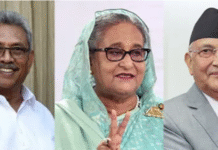
IT is hard to believe that the BNP leadership or its policy makers are not aware of the fact that the Jamaat is a greater burden now than ever before. The question is, was the Islamist party ever an asset to the BNP?
Without going over the history it has to be admitted that all the major political parties had hobnobbed with Jamaat since democracy was resurrected in the country in 1991, a fact that they conveniently want to avoid mentioning and would want the people to forget. If the military dictators used Jamaat to validate their policy and politics by exploiting public sentiments, it is disconcerting to see that the democratic political parties have followed the suit of the military rulers, and unabashedly too. Jamaat was a member of the anti-coalition alliances formed against Ershad, and that is what had lent a great degree of validity to Jamaat’s politics.
The trial and conviction of Jamaat leaders on charges of war crimes have brought its credentials as a political entity to the nadir of distrust. Jamaat’s fate is now in the hands of the court, but the verdict notwithstanding, the BNP must come clean on its links with the party that stands guilty as an ancillary of the Pakistan Army which directly supported its scorched earth policy in Bangladesh in 1971. It is time to think whether Jamaat is a Bangladesh-only party, given that there exists a strong link with the Pakistan Jamaat, and the official reaction from Pakistan to the death sentence awarded to Mir Quasem for war crimes.
One of the reasons that BNP’s much flaunted ‘movement’ against the government has not gotten off the ground is because of its association with the Jamaat. We have said before that the only reason why BNP has failed to muster the public in support of its demand for a fair, transparent and participatory election, that is very valid, is because of the unmitigated agony that the common person had to endure for the greater part of 2013 in the so-called 20-Party Alliance movement where the public was the victim of the violence that was outsourced to Jamaat.
And that only reinforced the popular perception that it was not the interest of the people that Jamaat was concerned with but ascension to power. The BNP, and I must add its entire coalition partners, by going along with the destructive politics of Jamaat, has to share the blame equally for perpetrating the havoc on the people and also the loss that the country had to endure economically.
Notwithstanding the pronouncements of government leaders about the peaceful atmosphere prevailing in the country and the very dangerous statement, which is increasingly assuming the form of a dangerous chorus, that it is development which must take precedence over democracy, even the AL leaders feel uncomfortable at the prevailing form of democracy with a unique parliament that has necessitated rewriting of political science books.
No matter how much the AL flaunts the two achievements in the CPA and IPU elections, both of the victories are creditable and no one should detract from the achievements, the current political arrangement is not what the people want. However, any talk of a future movement by the BNP inspires more fear than any kind of prospect for a political movement for true democracy in the country.
The question is does the BNP need Jamaat for its politics? And the question has become even more relevant after the statement of Mr. Azmi that it would never be possible for the BNP to come to power without the support of the Jamaat. Albeit the comment was personal, but it would not be wrong to suggest that Jamaat as a party feels the same regarding its relevance to BNP’s politics. We have heard no reaction from the BNP to Mr. Azmi’s comments either, but is difficult for one to believe that Jamaat has become indispensable for the BNP.
There is also confusion about the character of the BNP-Jamaat ‘alliance.’ One is also at a loss to rationalise the comments of the BNP that with Jamaat it is not so much an alliance; it is nothing more than an electoral arrangement and there is little fusion of its philosophy with that of Jamaat. One wonders whether it is possible to team up with anyone or any group without some shared fundamental belief. Needless to say Jamaat has become the proverbial burden of Sinbad. It has wrapped its legs around BNP’s leg that is becoming increasingly difficult to unwrap. Unless BNP takes some hard decisions about its future association with Jamaat it will lose much of its credibility as a political party.
Source: The Daily Star









